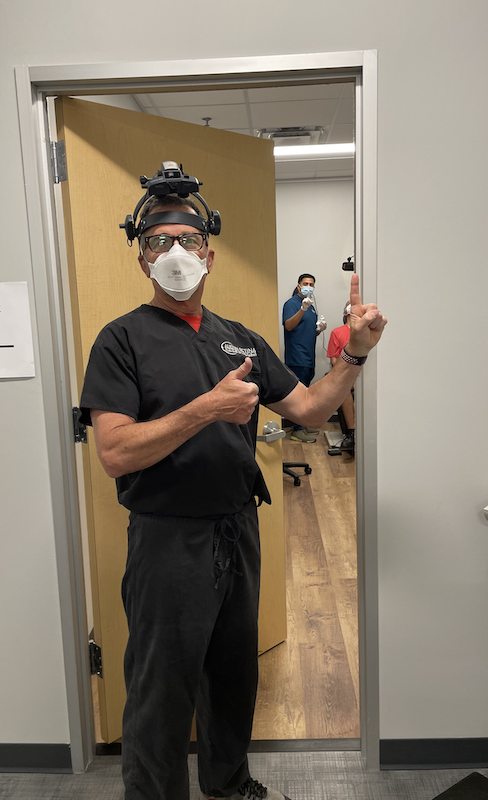Spotlight on Dr. Jose Agustin Martinez and National Hispanic Heritage Month

Each year National Hispanic Heritage Month is celebrated from September 15 – October 15 to recognize the important contributions Hispanic Americans have made to our nation.
We are honored to pay tribute to our Latino team members including Austin Retina President and retina specialist Dr. Jose Agustin Martinez.
Dr. Martinez is a board-certified ophthalmologist and fellowship trained vitreoretinal surgeon who has practiced with Austin Retina Associates since 1995. His specialties include the surgical and medical management of all diseases of the retina, vitreous and macula, diabetic retinopathy, retinal detachments, macular holes, and macular degeneration.
In honor of Hispanic Heritage Month, Dr. Martinez shares with us what it was like growing up in a Cuban immigrant family and how his experiences shaped his life and career in the medical profession.
Can you tell us about what Latino leaders were influential to you and your career? How did they inspire you?
The most influential Latin leaders to me and my career were my parents, siblings and extended family. I was brought up to believe the only minority I belonged to was the "minority of excellence.” Hard work and respect for all people were the key to a successful career and virtuous life. I was born into a Cuban immigrant family where most of the men were either doctors or dentists. It was clear they enjoyed their work and the perpetual learning required to excel at their craft. By being exposed to inspiring role models whose careers were typically in medicine, I grew up believing one should aspire to do the same. Additionally, I was often reminded by my parents of the importance of a formal education in preparing for a career. Having been political exiles, my parents especially appreciated the fact that no government could take away the knowledge and skills acquired during a medical education making a medical degree transferable and appreciated throughout the world.
How do you hope to impact the local Latino community?
Our core purpose at Austin Retina is to enhance the lives of the people in our community. As retina surgeons, we do that largely by saving sight, but we also view each human interaction as an opportunity to enhance another’s life. I do work with and serve many people of Latin origin while at work as coworkers and/or patients. I hope to impact the local Latin community by being available to all.
It is the human connections we make within each human interaction that will ultimately inspire all people as individuals to treat one another with respect and dignity.
How has your ethnicity impacted your ability to work with Latino patients?
Spanish was spoken at home while I grew up, giving me an appreciation and ability to communicate with my Spanish-speaking patients. I suspect having a Latin name brings some level of comfort and confidence to some patients as well. I was brought up to believe excellence lives within every community no matter the ethnic origin. To that end, I try to see each person as an individual first and foremost with their origins of lesser significance.
Do you work with any nonprofits or community organizations that specifically serve Latinos?
I do work with nonprofits that serve the entire community to the exclusion of none. I strongly believe we are all part of the human family, and consequently, I try to approach people as individuals with their own particularities.
Are there certain diagnoses/conditions that affect Latinos more than other ethnicities?
Diabetic eye disease (diabetic retinopathy) has a higher prevalence in the Latin community. Today’s treatments for diabetic eye disease, when applied in a timely fashion, are highly effective in saving sight by reducing the risk of blindness. The key to great diabetic eye care is having diabetic patients annually screened for eye disease since the best time to intervene is BEFORE symptoms start.
More About Diabetic Eye Disease
Diabetic eye disease is one of the leading causes of adult blindness in the United States. The severity of diabetic retinopathy is often directly related to elevated or inconsistent glucose levels in conjunction with high blood pressure. Regular testing to measure A1C scores, blood sugar levels, and blood pressure can help predict the potential for diabetic retinopathy and provide your retinal specialist the opportunity to be proactive with treatment before it is too late and vision is compromised.
The latest treatment options for diabetic retinopathy involve eye injections and laser therapy to stabilize the condition before it progresses further and can also restore vision in some cases.
For more information about retinal conditions or to schedule an appointment with one of our retinal specialists, please call 800-252-8259 or request an appointment online.
For the latest Austin Retina news, visit our blog or follow us on Facebook and Instagram.

